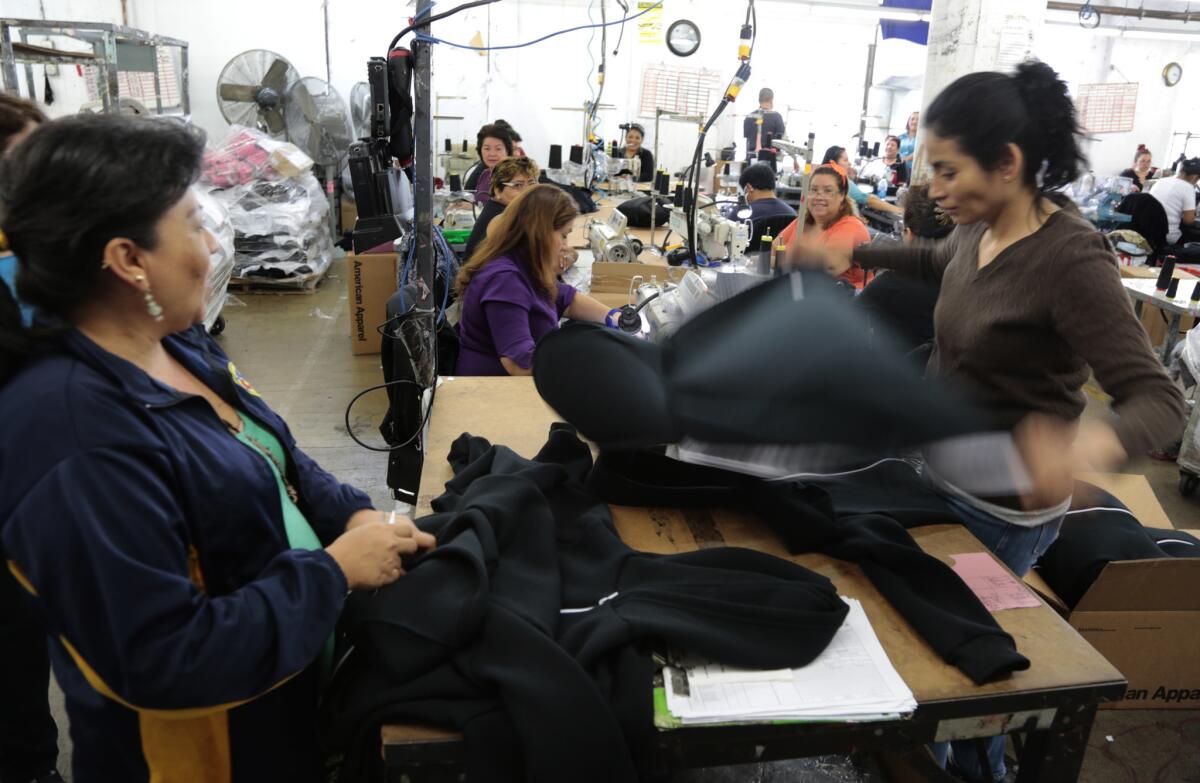American Apparel uses crowdsourcing to seek new product ideas

American Apparel workers sew and package black hoodies at the company’s Los Angeles factory on Feb. 27, 2015.
- Share via
American Apparel is soliciting ideas through a crowdsourcing campaign for products that are made in the U.S.
The Los Angeles-based company, which recently announced that it might start outsourcing some manufacturing to another U.S. clothing maker, is asking vendors to submit proposals for U.S.-made goods that would retail for $100 or less. The company said it wants ideas for “certain types of goods,” including footwear, jewelry and leather products.
Vendors must submit their ideas via a 90-second video, American Apparel said in a statement Wednesday. All proposals are due by June 17. Vendors must be able to make and deliver 500 items to American Apparel’s distribution center within a 30-day period.
“American Apparel will review each submission, with an eye toward what resonates with the spirit and DNA of American Apparel,” the statement said.
There’s no guarantee that any of the ideas will ultimately be sold by American Apparel. The company said it “will contact the selected vendors to discuss the terms for a future business relationship.”
On Thursday, six different vendors had submitted ideas, including a bow-tie maker based in Brooklyn, N.Y., and a Venice company that makes scarves. The public is invited to vote on each submission’s originality, style and creativity.
Kate Thorson, whose jewelry line Uma K is produced in downtown Los Angeles, said working with American Apparel would be a chance to reach more customers. If selected, the Laurel Canyon resident said she’d like to create a collection of brass rings to be sold by American Apparel.
“It’s a wonderful opportunity for me as a young brand to reach a younger demographic,” Thorson said. “People can be introduced to Uma K at a lower price point.”
Mitch Cahn, president of Unionwear in Newark, N.J., said American Apparel and similarly sized companies are a good fit for his firm. Founded in 1992, Unionwear makes hats, bags and other accessories for retailers, designers and other customers. Cahn said the company employs about 150 factory workers.
“We have a number of customers that have two to 500 stores,” he said. “It makes sense for a company of that size to buy domestically. That’s where our bread and butter is.”
Cahn said orders usually surge in a presidential election year such as 2016, when media scrutiny tends to bring more awareness of American-made goods. He said Unionwear often gets a 50% sales boost during such years; the company has already churned out items including hats and bags for Hillary Clinton, Bernie Sanders and Donald Trump (and anti-Trump groups as well).
“We see this cycle every four years,” he said. “There is way more attention to made-in-USA merchandise, whether it has to do with political campaigns or not.”
For American Apparel, its “Made In” campaign comes on the heels of its decision last month to lay off about 500 workers, and the announcement of its possible plans to outsource some garments.
Experts said American Apparel may eventually move all its manufacturing out of Los Angeles and to a part of the country, such as the South, where production costs are less. California’s recently enacted minimum wage of $15 an hour will put pressure on the company as well as other clothing manufacturers, analysts said.
The company reiterated Wednesday that it is committed to American manufacturing.
“We want to continue to support manufacturing in the U.S. by giving small businesses the opportunity to thrive and succeed,” said Cynthia Erland, senior vice president of marketing.
American Apparel has faced a period of turmoil following the ouster of founder Dov Charney as chief executive and chairman in 2014. In February, the company was taken private after emerging from Chapter 11 bankruptcy protection.
shan.li@latimes.com
Twitter: @ByShanLi
More to Read
Inside the business of entertainment
The Wide Shot brings you news, analysis and insights on everything from streaming wars to production — and what it all means for the future.
You may occasionally receive promotional content from the Los Angeles Times.











